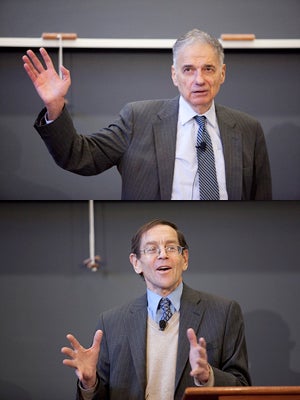Ralph Nader ’58 and Bruce Fein ’72 visited Harvard Law School for a talk sponsored by the HLS Forum and the Harvard Law Record. At the event, “America’s Lawless Empire: The Constitutional Crimes of Bush and Obama,” both men discussed what they called lawless, violent practices by the White House and its agencies that have become institutionalized by both political parties.
Fein has held positions in the Department of Justice and has served as research director for Republicans on the Joint Congressional Committee on Covert Arms Sales to Iran and on the American Bar Association’s Committee on Presidential Signing Statements. He provided examples of what he called constitutional crimes that have been perpetrated under both the Obama and Bush administrations, such as detaining enemy combatants indefinitely, diverting funds authorized for fighting terrorism to the wars in Afghanistan and Iraq, and using predator drones against persons never formally charged with a crime.
Nader, a consumer advocate, author, attorney, and five-time candidate for President, said that the government and the American people have rationalized illegality because the country has gotten used to the military-industrial complex and the corporate state under which it has been operating for more than half a century. He also discussed the many national security threats on America soil that, because they don’t stem from foreign terrorists, are ignored by the government. Thousands of Americans die each year due to workplace accidents, preventable pollution, and lack of access to health insurance, all under the apparent government protection of OSHA and the EPA. He said that the money spent on the war on terror should be diverted to child healthcare, advancement of education opportunities, public works, and environmental protection.
“The 300,000 Americans who die from preventable causes should reside under the definition of national security, but they aren’t the priority of any major party. Obama is more concerned with terrorists overseas than with the preventable deaths of these people directly under his authority and responsibility,” Nader said.
Both men took issue with the National Defense Authorization Act, which sets the budget and policies of the Department of Defense and generally expands the power of the government to fight the war on terror. The Act permits, among other practices, the indefinite detention of terrorism suspects without trial. Fein encouraged those in attendance to contact their members of congress about repealing it.
“I want to underscore that it is not an option in a democracy to be a spectator to politics, because it’s a collective endeavor,” Fein said. “We have a moral obligation to use our eyes and ears to check government abuses because, even if they don’t affect you, they could affect your neighbor.”
Lawyers in particular have a duty to be more than spectators, Nader concluded. Rather than profiting from conflict, they should work to prevent conflict and act with moral urgency to demand answers and transparency from the government, particularly when it is engaged in acts of war.
The talk was sponsored by HLS Forum and the Harvard Law Record. HLS Forum is a nonpartisan student organization dedicated to bringing open discussion of a broad range of legal, political and social issues to Harvard Law School. It was founded after World War II by 30 returning soldiers as a memorial to their fellow students who died in the war. The Harvard Law Record, published since 1946, is the oldest law school-affiliated newspaper in the United States.
